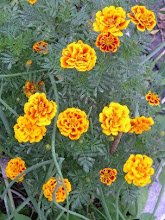 This soulful gentlemen is Wendell Berry, one of my personal Icons. he is a farmer, a writer, a poet, a thinker, a true environmentalist. I have just read an interview with him in Sojourner Magazine online, and i want to share it with you. Sojourners is an organization of "Christians for Justice and Peace" that i visit from time to time to remind me that all Christians are not John Ashcroft, George W., Pat Robertson, Jerry Falwell, the guy whose name i forget who shows up everywhere with signs that say "God Hates Fags", etc. Their magazine is actually an excellent source for intelligent reading.
This soulful gentlemen is Wendell Berry, one of my personal Icons. he is a farmer, a writer, a poet, a thinker, a true environmentalist. I have just read an interview with him in Sojourner Magazine online, and i want to share it with you. Sojourners is an organization of "Christians for Justice and Peace" that i visit from time to time to remind me that all Christians are not John Ashcroft, George W., Pat Robertson, Jerry Falwell, the guy whose name i forget who shows up everywhere with signs that say "God Hates Fags", etc. Their magazine is actually an excellent source for intelligent reading.
i thought about posting the whole interview here, but maybe you're getting tired of reading other people's words where i'm supposed to be writing. little time recently for original thoughts, i'm afraid. besides, my thoughts and words could never come close to Berry's. this is an exceptionally insightful piece, the interviewer's name is Rose Marie Berger and she's right on her subject's wavelength. Berry talks about everything from the Kentucky farmland where he lives, to corporate takeover of everything, Thomas Merton, Christianity and the Bible, his own writing, and language in general. in case you don't think you want to take the time to read the piece, let me give you a few tastes.
On Jesus, and his example:
But Christ was quite explicit, for instance, about his pacifism. You can't be more explicit than "Love your enemies." He did run those people out of the temple, but he didn't kill them.
People are always talking about the first church. The real first church was that gaggle of people who followed Jesus around. We don't know anything about them. But he apparently didn't ask them what creed they subscribed to, or what their sexual preference was, or any of that. He fed them. He healed them. He forgave them. He is clear about sin, but he was also for forgiveness.
On genetic engineering of crops:
I think that the real reason for genetic engineering is to put absolute control of the food system into corporate hands. They don't want anybody - farmer or urban consumer or anybody else - to have anything whatsoever that they don't buy from a corporation at the corporation's price. In other words, economic totalitarianism is the goal. And I don't think the difference between political totalitarianism and economic totalitarianism is worth lingering over. If you're not economically free, if you don't have economic choices, you're not free.
The conclusion of the interview, words that apply to today in such an immediate way:
We're a pretty bad species in a lot of ways and in other ways a pretty good one. We can become a warrior civilization and live by piracy; on the other hand, we're capable of lovingkindness, of genuine affection, of generosity, of friendship, of peaceability, of forgiveness and gratitude. It's a question of where you want to put your influence, how you want to apply the little means that you have. It's too easy to say that country people are provincial and prejudiced, as if the worst things that humans are capable of hadn't also risen up in cosmopolitan, highly sophisticated, urban civilizations. That's just a passing of blame. If you can blame it all on people out in the provinces then you don't have to worry about what's going on in your urban neighborhood or in your urban soul.
One of the oldest human artifacts is the trade route. People were trading in obsidian and other rare things long before history. So we know there's going to be trade, we know that you can't isolate a culture and keep it going without cultural interchange. You can't live without influence, you can't live without change, you can't live without trade.
The serious question is whether you're going to become a warrior community and live by piracy, by taking what you need from other people. I think the only antidote to that is imagination. You have to develop your imagination to the point that permits sympathy to happen. You have to be able to imagine lives that are not yours or the lives of your loved ones or the lives of your neighbors. You have to have at least enough imagination to understand that if you want the benefits of compassion, you must be compassionate. If you want forgiveness you must be forgiving. It's a difficult business, being human.
It's a gorgeous piece, i hope you have time to read it all. then go get a book by Berry, and spend some time absorbing his amazing nature. this man is a national treasure. in my book journal i have posted two of Berry's poems, "Manifesto" being one of my absolute favorites.

3 comments:
Love Wendell Berry and Thomas Merton
I started to read the article before I realized I was going to have to set aside some time to REALLY read it.
Wendell Berry is a local hero here in Kentucky, it's always disconcerting to realize that we actually share him with the world, and for all the right reasons.
Thanks. I'll definitely take a look. I've been reading some of Joseph Campbell lately. I like how he incorporates non-traditional teachings into his thoughts.
:-) ---Robbie
Post a Comment